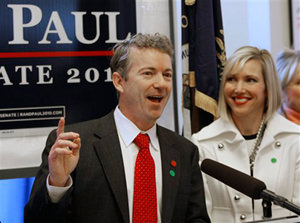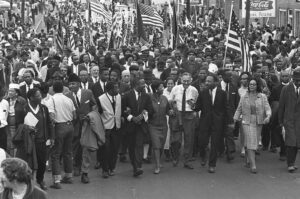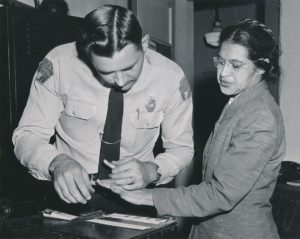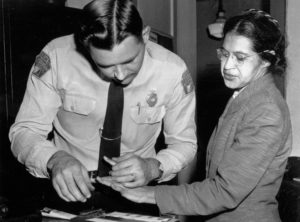What’s Not to Like About Civil Rights?
For Rand Paul, the issue is not about race and it’s not about guns either It’s about government interference with privacy rights But what Paul and others may not be remembering is that race, violence and privacy rights go hand in hand For Rand Paul, the issue is not about race and it’s not about guns either.
Dr. Rand Paul, winner of Kentucky’s GOP primary for the U.S. Senate and a tea party favorite, made headlines recently with regard to statements about the impact of federal legislation on individual rights. Paul’s website claims: “The Federal Government must return to its constitutionally enumerated powers and restore our inalienable rights. America can prosper, preserve personal liberty, and repel national security threats without intruding into the personal lives of its citizens.” This statement sounds perfectly legitimate and libertarian. Yet Paul’s comments on the wisdom of Title II, Section 201 (b) (2), of the 1964 Civil Rights Act have made some wonder what this statement really means. Does it mean, as Paul said in a recent interview with the editorial board of the Louisville Courier-Journal, that legislation like the Civil Rights Act represents an idea not worth liking?
Opinions abound. Some, like Republican National Committee Chairman Michael Steele, believe that Paul was undermining the legitimacy of the Civil Rights Act and that his ideology seems “out of place” in our current historical moment. Despite this, bloggers like The Scooting Scholar wonder whether Paul’s comments reveal a glimpse into a colorblind philosophical future where there would be no need for enforcing civil rights legislation. That’s why others aren’t so quick to rush to judgment. For instance, Sarah Palin suggests that Paul’s comments have been misinterpreted and spun by the “liberal media” to create a “gotcha moment.”
Here’s what Paul had to say about it to The New York Times. “Let me be clear: I support the Civil Rights Act because I overwhelmingly agree with the intent of the legislation, which was to stop discrimination in the public sphere and halt the abhorrent practice of segregation and Jim Crow laws.”
In a follow-up interview with CNN, Paul went on to explain that he would have supported the act if he had been a voting member of the Senate in 1964. And, in interviews with NPR’s Robert Siegel and MSNBC’s Rachel Maddow, Paul attempted to further clarify his position. Paul addressed the question of civil rights with respect to public accommodations by debating Maddow when he said: “[I]f you decide that restaurants are publicly owned and not privately owned, then do you say that you should have the right to bring a gun into a restaurant even though the owner of the restaurant says, ‘Well, no, we don’t want to have guns in here’; the bar says, ‘We don’t want to have guns in here because people might drink and start fighting and shoot each other.’ Does the owner of the restaurant own his restaurant or does the government?” Paul later said that he felt his interview with Maddow was fair, but that other media coverage was not.
For Paul, the issue here is not about race and it’s not about guns either. It’s about government interference with privacy rights. But what Paul and others may not be remembering is that race, violence and privacy rights go hand in hand. This trend goes back to the slavery era and is seen even more blatantly in the majority ruling in the 1896 case Plessy v. Ferguson. Commenting on this ruling in a 1991 article for the Harvard Law Review, UCLA law professor Cheryl I. Harris argues that an individual’s racial identity, and specifically his or her white racial identity, can be considered a legal property interest. Her argument has three main points: First, a person’s ability to be identified as white legally and historically bequeathed slave or free status. Second, a person’s slave or free status determined that person’s legal personhood (as slave three-fifths of a person and as free five-fifths of a person) and ability to enjoy rights, privileges and material benefits of personhood. Finally, therefore, a person’s ability to be identified as white is a form of property that has exclusive (read: private) rights of use and enjoyment. According to Harris, to believe in the right to privacy is also to believe, even if unwittingly, in racial inequality.
Patricia Williams puts it differently. In her book “The Alchemy of Race and Rights,” Williams explains that “the over-expanded mental state we call ‘privacy’ ” is among the most pernicious and subtle contemporary enemies of substantive democracy, as well as a powerful mode of justifying class and race inequalities. “The tyranny of what we call the private,” she argues, risks reducing us to “the life crushing disenfranchisement of an entirely owned world where permission must be sought to walk on the face of the earth.”
If we follow Harris’ and Williams’ thinking, we find that Paul’s statements are rooted in the ideal of American individualism. Culturally and politically speaking, that can be a good thing. And, if we dig a bit deeper, we find that Paul’s comments may also be invested in the identity intersection of the default legal persona as white, propertied and male. Especially when we consider that the value of this default figure was assigned legally and calculated along with a right to privacy — defined as the right of those who own the property to exclusive use, distribution and enjoyment of particular privileges. History has shown us that privacy and exclusivity aren’t just symbols or ideals that affect the individual. Rather, they have real effects that make racial categories equivalent to “the buses, private clubs, neighborhoods and schools that provide the extracorporeal battleground for their expression” and all too often protect the battleground violently. Seen in this light, private exclusivity is the foundation for U.S. citizenship according to the 14th Amendment and the right that the court judged did not apply to nonwhite people when it institutionalized and normalized Jim and Jane Crow law. Paul himself admits that’s not such a good thing.
So, what to make of these controversial comments? If nothing else, Paul has invited us to continue a conversation about American identity and the roles of government in determining the rights of social groups and individuals. If nothing more, Paul has distracted us from other concerns about race and class that deserve our undivided attention on behalf of our fellow Americans.
Your support matters…Independent journalism is under threat and overshadowed by heavily funded mainstream media.
You can help level the playing field. Become a member.
Your tax-deductible contribution keeps us digging beneath the headlines to give you thought-provoking, investigative reporting and analysis that unearths what's really happening- without compromise.
Give today to support our courageous, independent journalists.






You need to be a supporter to comment.
There are currently no responses to this article.
Be the first to respond.